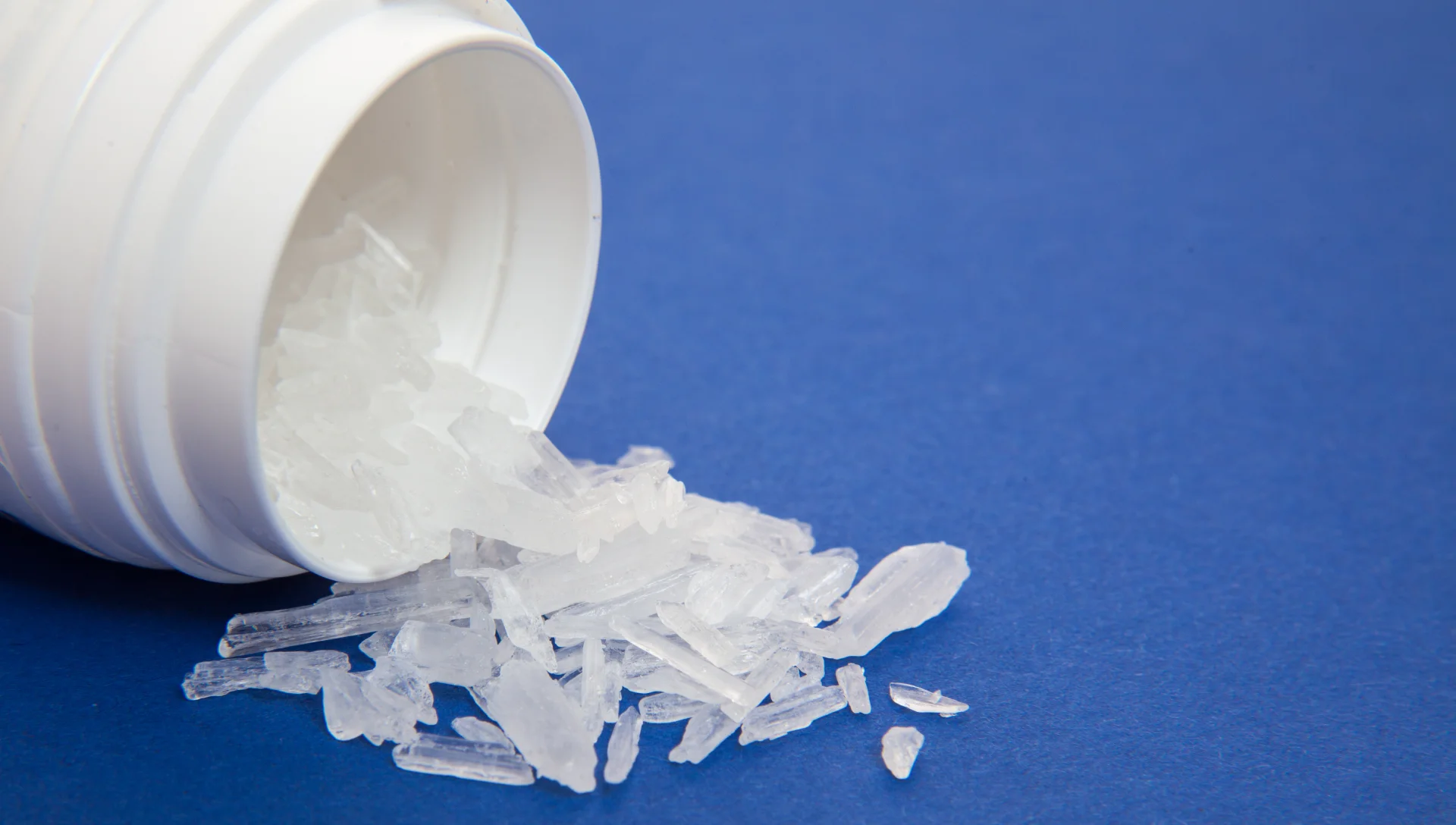Meth Addiction Treatment in Long Island
A Long Island, focused guide to meth recovery, what withdrawal involves, why structured care matters, and which treatments work best (Matrix Model, CBT/DBT, dual-diagnosis).
Covered by most insurance plans
Available to help you 24/7
Table of Contents
Crystal meth recovery is absolutely possible and getting matched to the right Long Island care makes a real difference. Methamphetamine (including crystal meth/ice) is a powerful CNS stimulant that can hijack dopamine pathways, drive compulsive use, and unravel sleep, mood, teeth/skin health, and relationships. Effective treatment on Long Island typically combines structured withdrawal support, evidence-based behavioral therapies (Matrix Model, Contingency Management, CBT/DBT), psychiatric care for co-occurring disorders, and strong aftercare. Long Island Interventions provides discreet placement into vetted Nassau/Suffolk programs (residential, PHP/IOP, outpatient, dual-diagnosis psychiatry) that fit your goals, schedule, and insurance.

Common Signs You’re Noticing
- Physical: rapid weight loss, insomnia or hypersomnia, teeth grinding (“meth mouth”), sores/picking, overheating, palpitations.
- Cognitive/psychiatric: anxiety, depression, irritability, paranoia, hallucinations (visual/tactile “formication”), memory lapses.
- Behavioral: runs of hyperactivity then crashes, isolation, missing school/work, risky spending/behaviors.
Withdrawal: How It Really Feels
Meth withdrawal is primarily psychological but very real: crushing fatigue, hypersomnia/insomnia cycles, low mood/anhedonia, anxiety, vivid dreams, increased appetite, and strong cravings. A typical arc:
- 0–48 hours (crash): exhaustion, sleep rebound, headache, dysphoria, appetite return, GI upset.
- Days 3–10 (peak): mood swings, anxiety/irritability, intense cravings, concentration problems.
- Weeks 2–4: gradual improvement; cravings come in waves; sleep/mood still fragile.
- 1–3+ months: “PAWS” for some intermittent low motivation, sleep drift, cue-triggered urges managed with therapy/skills.
Detox & Safety
There’s no single “detox medication” for stimulants. Supportive, low-stimulation environments; hydration and nutrition; sleep restoration; and careful monitoring for depression, psychosis, or suicidality are key. Short-term, non-addictive meds may target symptoms (e.g., sleep or anxiety) when appropriate. If you or a loved one has chest pain, severe agitation/psychosis, or suicidal thoughts, call 911.
What Works Best for Meth Use Disorder
- Matrix Model (gold-standard for stimulants): a 16-week, highly structured program combining CBT, relapse-prevention, family education, and regular urine testing with a warm, coaching style.
- Contingency Management (CM): immediate, meaningful rewards for negative screens/goal milestones one of the most effective tools for stimulants.
- CBT/DBT skills: trigger mapping, craving surfing, emotion regulation, distress tolerance, and sleep skills to stabilize the nervous system.
- Psychiatric care (dual diagnosis): evaluate and treat depression, anxiety, PTSD, ADHD, or psychosis; consider non-stimulant ADHD options when indicated.
- Peer & family supports: community reinforcement, CRAFT-based family coaching, and sober routines (sleep, exercise, nutrition, purpose).
Why Meth Is So Addictive
Meth releases a surge of dopamine and slows its reuptake, creating intense euphoria and focus. Repeated use down-regulates receptors, so everyday pleasures feel “flat,” sleep collapses, and binges (“runs”) replace normal routines. Routes include smoking, snorting, swallowing, or injecting; mixing with opioids (“goofball”) sharply increases overdose risk.

Medication Notes (Set Expectations)
While there’s no FDA-approved pharmacotherapy specifically for methamphetamine use disorder, clinicians may use targeted meds to help with co-occurring conditions (e.g., antidepressants for persistent depression, non-addictive sleep aids short-term). Your prescriber will individualize choices and avoid habit-forming agents.
Levels of Care on Long Island
- Residential (inpatient): 24/7 structure for severe use, repeated relapse, psychosis, or unsafe environments.
- PHP/IOP: step-down intensive therapy several days per week; integrates CM, Matrix, psychiatry, and family work.
- Outpatient/individual: therapy + medication management for stable clients with strong supports.
- Adolescent tracks: school coordination (Hofstra/Adelphi/Stony Brook/LI districts), parent coaching, executive-function support.
Harm Reduction & Relapse Prevention
- Avoid mixing with opioids/benzodiazepines and steer clear of unknown pills (fentanyl contamination risk); carry naloxone if any opioid exposure is possible.
- Rebuild sleep first; set consistent wake time; limit caffeine/energy drinks early in recovery.
- Plan for triggers (people/places/paydays); use “If-Then” coping scripts and urge-surfing; keep a cravings log.
- Teeth/skin care: dental referral, gentle skincare, treat infections promptly.
How Long Island Addiction Resources Helps
We do not run a detox or rehab unit. We’re a confidential intervention and care-navigation service based on Long Island. We verify benefits and place you with vetted Nassau/Suffolk programs that deliver Matrix/CM, dual-diagnosis psychiatry, and step-down aftercare. We also coordinate professional interventions, transportation, work/school notes, and relapse-prevention planning. If your needs fall outside our scope, we’ll refer you to a trusted affiliate promptly.
Start today
If you or a loved one are ready to end your alcohol and drug use, there are many recovery options available near you in Long Island
Rehab Programs
Are you ready to take back control over your life?
Making the decision to seek help is one of the hardest and bravest steps you can take. We know that the recovery process is not always easy—there may be challenges along the way—but every step forward brings you closer to a life free from the weight of addiction.
Let today be
your Day 1
We'll get on a call, assess your health history, and verify your insurance. Today is Day 1. We can't wait to celebrate Day 1000 with you!
Fill out this simple form and we’ll call you right back.
Frequently Asked Questions
We'll get on a call, assess your health history, and verify your insurance. Today is Day 1. We can't wait to celebrate Day 1000 with you!
What happens during meth withdrawal?
Withdrawal often brings exhaustion, depression, anxiety, intense cravings, increased appetite, and disrupted sleep. These symptoms can last from days to weeks depending on the severity of use.
What therapies are most effective for meth addiction?
Evidence-based approaches like the Matrix Model, Contingency Management, Cognitive Behavioral Therapy (CBT), and Dialectical Behavior Therapy (DBT) help individuals rebuild healthy habits and manage triggers.
Can people recover fully from crystal meth addiction?
Yes. With structured care, therapy, medical supervision, and ongoing support, many people achieve long-term recovery and rebuild stable, healthy lives.
What role does family support play in recovery?
Family therapy and education help rebuild trust, improve communication, and create a supportive home environment that strengthens long-term sobriety.
What are the signs of meth addiction?
Common signs include extreme energy or agitation, weight loss, paranoia, sleep deprivation, mood swings, dental decay (“meth mouth”), skin sores, and risky or impulsive behaviors.














